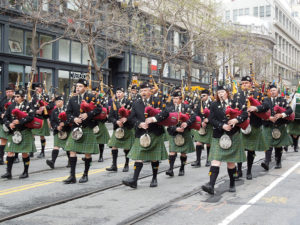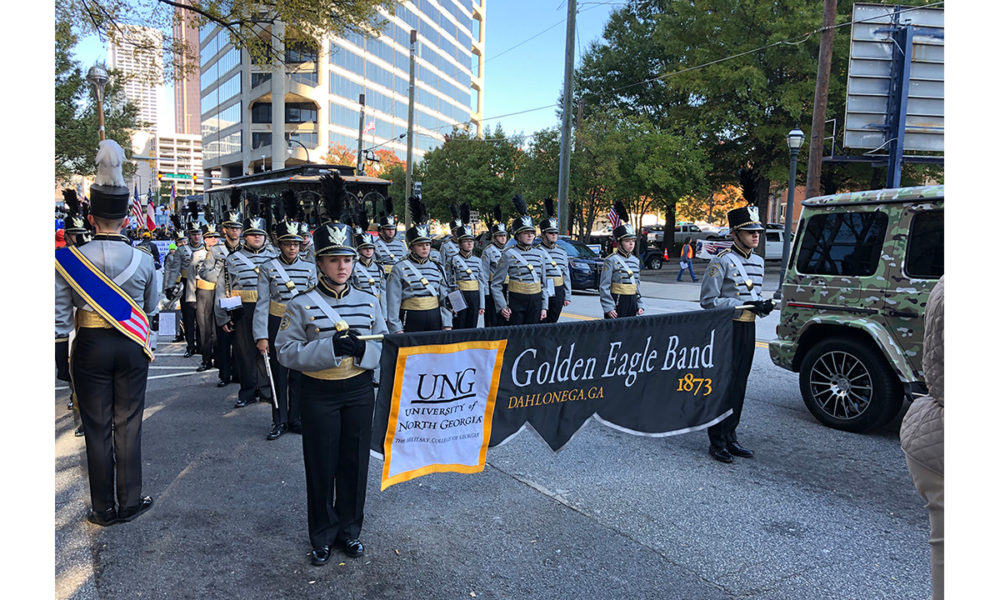With major cities canceling their St. Patrick’s Day celebrations to help mitigate spread of the coronavirus, marching participants look toward next year.
The COVID-19 virus, commonly called coronavirus, has changed the way Americans work, play, learn, and celebrate holidays. To comply with emergency directives set forth by policymakers, many cities postponed or canceled their 2020 St. Patrick’s Day parades and festivities.
In a press release, New York Governor Andrew M. Cuomo said, “I recommended and the parade’s leadership agreed to postpone this year’s parade due to the high density and the large volume of marchers and spectators who attend.”
The NYC St. Patrick’s Day Parade would typically have about 250,000 participants and up to 2 million spectators.
Chicago Mayor Lori E. Lightfoot and Illinois Governor JB Pritzker postponed and then canceled Chicago’s parade, saying in a joint press release that they wanted “to prevent further spread of the Coronavirus Disease 2019.”
Known for dying its river green to commemorate St. Patrick’s Day, Chicago also eliminated that annual ceremony.
More Than a Parade
Held annually since March 17, 1762, New York’s parade has survived the American Revolution, the Civil War, World War I, the Great Depression, and World War II. The six-hour spectacle would have involved 224 units, including 176 marching arts groups, this year.
“It’s a traditional parade that people come out to march in and are proud to march in,” says Hilary Beirne, chairman of The St. Patrick’s Day Foundation, NYC, and chief administrative officer of the NYC St. Patrick’s Day Parade.
Had the event proceeded as planned on March 17, the Londonderry (New Hampshire) High School Marching Band would have escorted the Grand Marshal, James T. Callahan, president of an engineers’ union. This year would have been the 27th time that the 230-member group marched in the parade.
Londonderry students missed out on more than New York’s parade. The marching band had also planned to participate in Washington, D.C.’s parade on March 15, and the symphonic band was slated to perform at Carnegie Hall for the New York Invitational Music Festival on March 16. Both events were canceled.
Londonderry’s students were “bummed,” says Serge Beaulieu, the school’s director of music. “They were also very understanding of the situation. A lot of parents [were] relieved.”
The cancellations represent a lost opportunity for Beaulieu’s students to acquire and hone real-world skills. “Opportunities like this help to build our program in many ways,” Beaulieu says. “First, it gives our students an opportunity to learn outside of the classroom. Travel skills, teamwork, logistics, student self-directed learning, and performing for a bigger audience are all very valuable. Secondly, it’s something the students look forward to and sometimes provides a carrot for the students to work hard all year.”
Farther south, the Golden Eagle Band at the University of North Georgia (UNG) would have led the St. Patrick’s Day Parade in Savannah, Georgia. “UNG does not have a football team, so we do not learn traditional halftime show type drills, but the group learns and performs the type of drill that a military band would perform during a military review or ceremony,” says Dr. Bart Walters, director.
The Savannah St. Patrick’s Day Parade Committee typically presents seven awards to bands, societies, commercial entries, etc. “Every commercial entry, band, and family that is entered in the parade receives a plaque in honor of a deceased loved one or a past Grand Marshal,” says Bubba Edgerly, general chairman of the committee.
The Berkeley Preparatory School Pipe and Drum Corps from Tampa, Florida, has marched in the South Boston St. Patrick’s Day / Evacuation Day Parade for more than 20 years. After the cancellation, “our students were devastated—especially our seniors,” says Patrick Fisher, music director at Berkeley Preparatory. “This was the highlight of their year. It has been a tradition since 1998.”
Fisher’s students love attending Boston’s parade for a variety of reasons. One is the parade’s historic route, which meanders through the city’s south-side neighborhoods for slightly more than 3.5 miles.
The parade passes the hill at Dorchester Heights, on which Colonel Henry Knox ordered Colonial soldiers to position 59 cannons that they had dragged 300 miles from Fort Ticonderoga in Upstate New York to Boston in 1776. That maneuver led British General William Howe to evacuate Boston Harbor on March 17, leading to a holiday in Boston called Evacuation Day that gets celebrated at the same time as St. Patrick’s Day.
Boston has celebrated the two holidays jointly since 1901 though the city’s history of parading on St. Patrick’s Day begins as early as 1737.
Each year when Fisher’s ensemble travels to Boston, its members dine at the Union Oyster House. During dinner, they would reflect on the year’s accomplishments. “It was our place to celebrate,” Fisher says. “I would always give a speech at the end.”
On the whiteboard in Fisher’s band room, students tick off the days leading up to the parade on what they call the Boston Countdown Calendar. “They change [it] every day,” he says. “It was with great sadness when we got the news that a kid changed it from four days to 369 [days].”
There’s Always Next Year
One by one as cities postponed or canceled their parades and events, band directors and students who’d arranged travel faced logistical issues. Because the virus was “somewhat an act of God,” Beaulieu says, he’s seeking refunds from the hotels, tour buses, and events. “Fortunately, most are willing to help and are providing most of the money back,” Beaulieu says.
Fisher’s students had already paid for their airfare, hotel, and ground transportation. The hotel issued a full refund; the airline issued a credit that’s good for one year.
For 2021, Berkley Preparatory and other marching ensembles might find a very different kind of parade in Boston, according to Bryan Bishop, director of parade operations. Bishop says that he intends to model next year’s event after the Macy’s Thanksgiving Day Parade. “[There will] probably be more units because we’re changing the format a little bit and going a little more band-heavy,” he says.
Next year all marching units will be reviewed, judged, and awarded, Bishop says. “We’re trying to make it a cultural experience for them but also add to the layers of cultural diversity within the parade itself,” he says.
To sweeten the pot, if he can garner sufficient sponsorship, Bishop will hold a marching band competition, to be named the Shamrock Invitational, on the day before the parade. “The band that wins that competition will lead the parade,” he says. “It will be a way for us to bring more awareness to the marching arts.”
Mixed Feelings
Despite its name and the fact that it has its own Blarney Stone, Dublin, Ohio, hasn’t always hosted a St. Patrick’s Day Parade. As the legend goes, in 1980, a deejay from New York phoned the mayor of Dublin and asked how the city was planning to celebrate St. Patrick’s Day. Mayor Catherine Headlee was embarrassed to admit that she and her city had no plans. The following year, the city’s St. Patrick’s Day festivities began in earnest.
But that tradition has been put on hold. Dublin canceled its parade when Ohio Governor Mike DeWine signed an order prohibiting gatherings of 100 people or more anywhere in the state.
The cancellation of Dublin’s parade spawned a variety of feelings for local marching bands. “When we were informed by the City of Dublin that the parade had been canceled, there were visible mixed reactions, not just among the students, but within them as well,” says Jim Gray, director of the Dublin Scioto Bands and Orchestras. “Some students love to do parades; some don’t.”
Gray says that he keeps his band “perpetually ready for events like parades,” so they required only two days to prepare the music. “We’ll go back into concert band mode and pick up where we were,” Gray says. “[As a local marching band,] logistically it hasn’t impacted us because the cancellation came with plenty of advanced warning.”
Known as the “Greenest, Grandest Parade” and featuring large helium balloons, Dublin’s St. Patrick’s Day Parade typically heralds the arrival of spring. “We just won’t get to see all the little kids lining the parade route wearing shamrock stickers on their faces while waving,” Gray says.
 Making the Most of It
Making the Most of It
San Francisco’s St. Patrick’s Day Parade, which was one of the first in the country to be postponed, grew out of the Gold Rush boom and launched in 1853. The Irish Pipers Band of San Francisco, which formed in 1932, would have led the parade as usual with pipers and drummers wearing their County Wexford Tartan.
The Irish Pipers did perform at the Grand Marshal’s Dinner on Feb. 28 and its Irish Flag Raising at City Hall on March 6. As health advisories directed individuals to increase social distancing and avoid crowds, the Irish Pipers’ board voted to cancel its remaining events, says Craig Farley, president of the group.
The Irish Pipers lost revenues as a result of those canceled events, but the health of the members was Farley’s top priority. Despite the postponements, Farley remains optimistic about the future. “We are looking forward to a rescheduled parade when this health crisis has passed,” Farley says.

